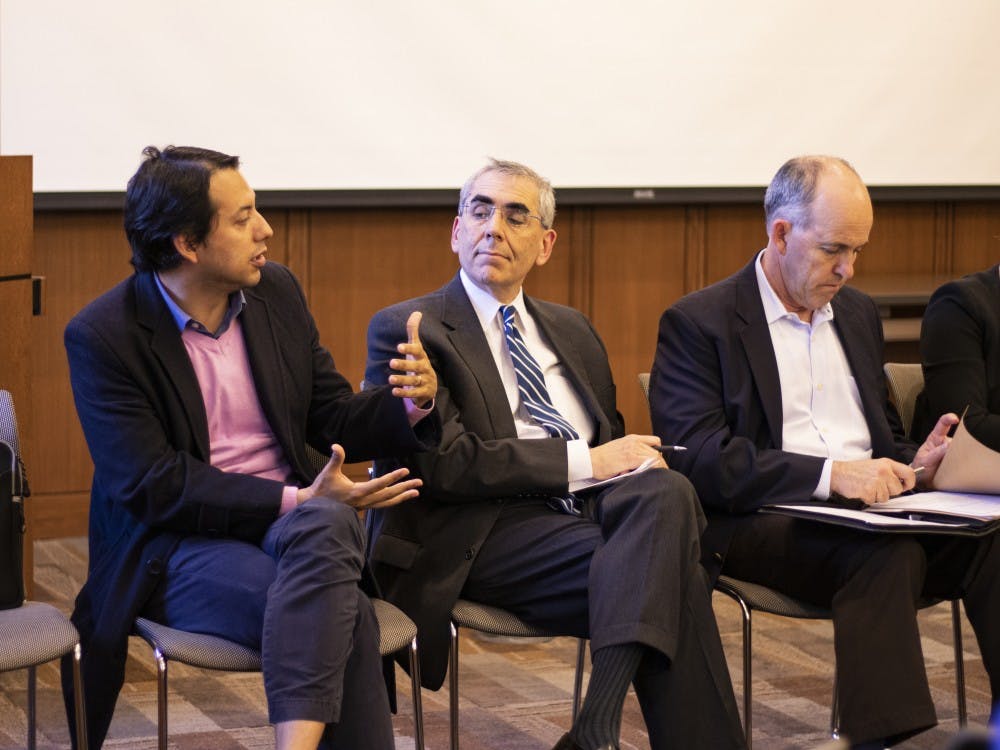In the Board of Trustees’ second open forum of the year, a panel without any trustees contended with issues such as graduate student housing, student-faculty relationships and campus crime.
Duke plans to build new graduate housing, a panelist explained. Additionally, Student Affairs is exploring the possibility of a faculty-in-residence program on West Campus.
Richard Riddell, senior vice president and secretary to the Board, moderated the panel. The Board offers open forums of this nature four times per year.
Paul Manning, director of project management for Duke Facilities, discussed the feasibility of constructing more expansive housing complexes, particularly for graduate students. At the moment, some pursuing advanced degrees live at 301 Swift Avenue, but with the demolition of Central Campus, Duke has largely lost an on-campus location to house these individuals.
According to Manning, graduate students found living on Central Campus to be inconvenient and preferred to live on the west side of West Campus, with the Law School, the Sanford School of Public Policy and the Fuqua School of Business all in close proximity.
Any new residential areas will be treated as permanent structures and thus receive the most complete and thorough accommodations available today.
“Duke builds structures to last for 50 to 100 years,” Manning said.
Senior Gino Nuzzolillo, a columnist for The Chronicle, asked how Duke could ensure the best housing conditions possible if it is outsourcing control to a third-party vendor. Manning acknowledged potential risks but noted that because Duke will still supply utilities to the building as a natural extension of on-campus facilities, the University will retain a great deal of direct oversight of and engagement with the project.
Manning also touched on the potential environmental effects of construction. Duke will most likely build on the south side of Towerview Road, which includes mostly invasive species in its environment and is within a short walk of graduate facilities. While the area does contain a few indigenous hardwood trees, a team of environmentalists, hired by Duke to survey the area, assessed that the project overall posed little threat to nature.
But the south side of the road does not possess adequate drainage, whereas the north side, much more vibrant in terms of biodiversity, borders a pond logical for water runoff. As pressing an issue as graduate housing is, Duke will not rush this decision. Given the various angles to the issue, Duke may not reach a conclusion for months, Manning said.
Mary Pat McMahon, vice provost/vice president for student affairs, highlighted the desire for stronger student-faculty relationships, particularly in co-curricular activities. Fundamentally, McMahon’s job is to prepare students to apply classroom skills to the outside world, she said, and more faculty engagement will assure broad development of these skills.
Some organizations have faculty advisors involved in the day-to-day operations, while others are lacking that professional presence and mature guidance, so she mentioned that future interest clubs may mandate the active participation of professors. Another evaluated option is the introduction of faculty-in-residence rooms onto West Campus in a manner similar to those on East Campus, which pairs each dorm with a professor, McMahon explained.
Leigh Goller, chief risk, audit and compliance officer for the Office of Audit, Risk and Compliance, reported that Duke anticipates a decline in students affected by violent crime and theft in the coming year. Due to the closure of Central Campus, students travel less frequently on Erwin Road, which statistically exposed the student population to more risk than any other adjacent street.
It is relevant how Duke defines its property, however—Duke’s properties in China and Singapore do not fall under this jurisdiction, nor does the American Tobacco Campus, which employs 3,000 workers. Therefore the annual audit does not consider crime at these locations when assessing Duke’s safety, Goller said.
Michael Schoenfeld, vice president for public affairs and government relations, and David Kennedy, vice president of alumni affairs and development, then shared that the University is speaking to new stakeholders about potential projects in science and technology, which include ideas “that could be advantageous to Duke in the future,” Kennedy said.
Robin Rasor, executive director of the office of licensing and ventures, mentioned the university’s push to protect intellectual property both domestically and abroad. She was pleasantly surprised when the Board commended her efforts, yet she is not fully satisfied.
Graduate student Edgar Rodriguez voiced his appreciation for Rasor’s work, especially in terms of “parity” of treatment for international students.
Riddell ended the meeting by reminding the audience about the next open forum, which will be held in December. This discussion will include Durham leaders and focus on Duke’s relationship with the city.
Get The Chronicle straight to your inbox
Signup for our weekly newsletter. Cancel at any time.

